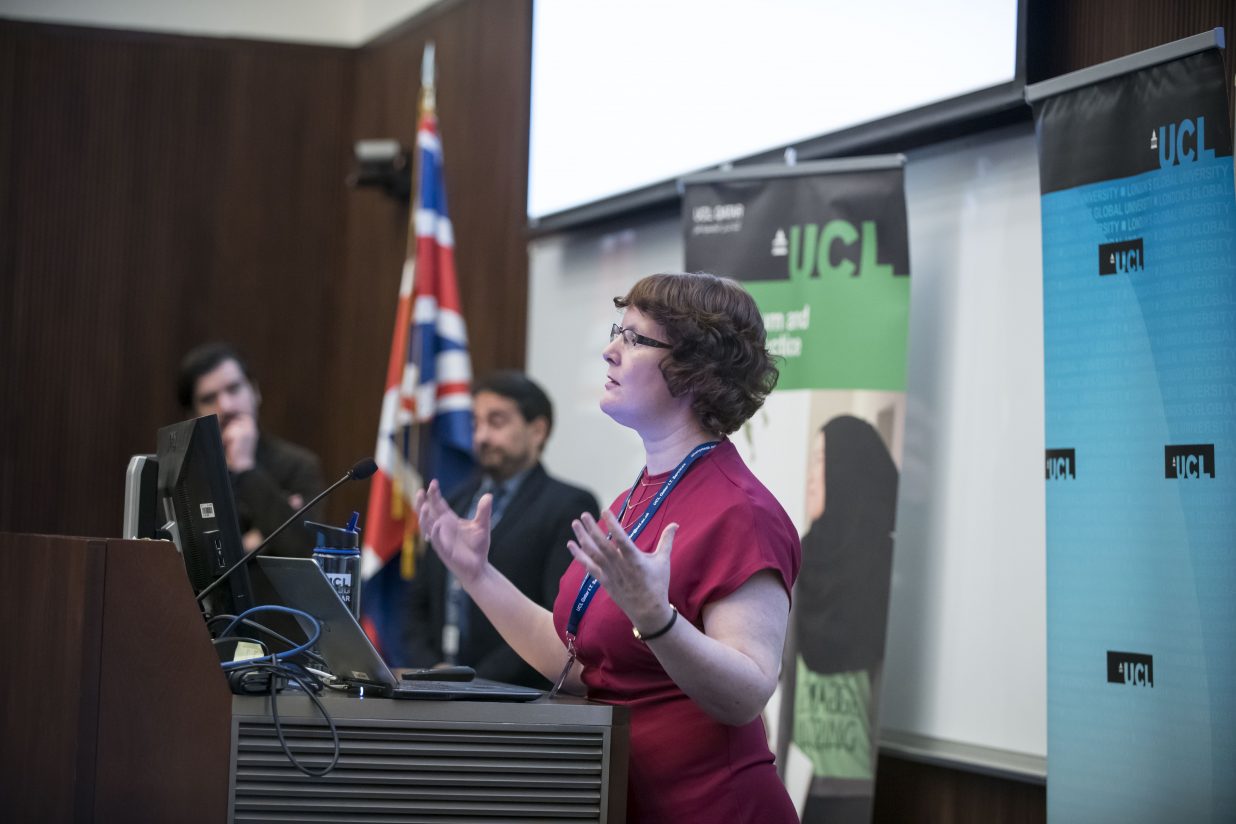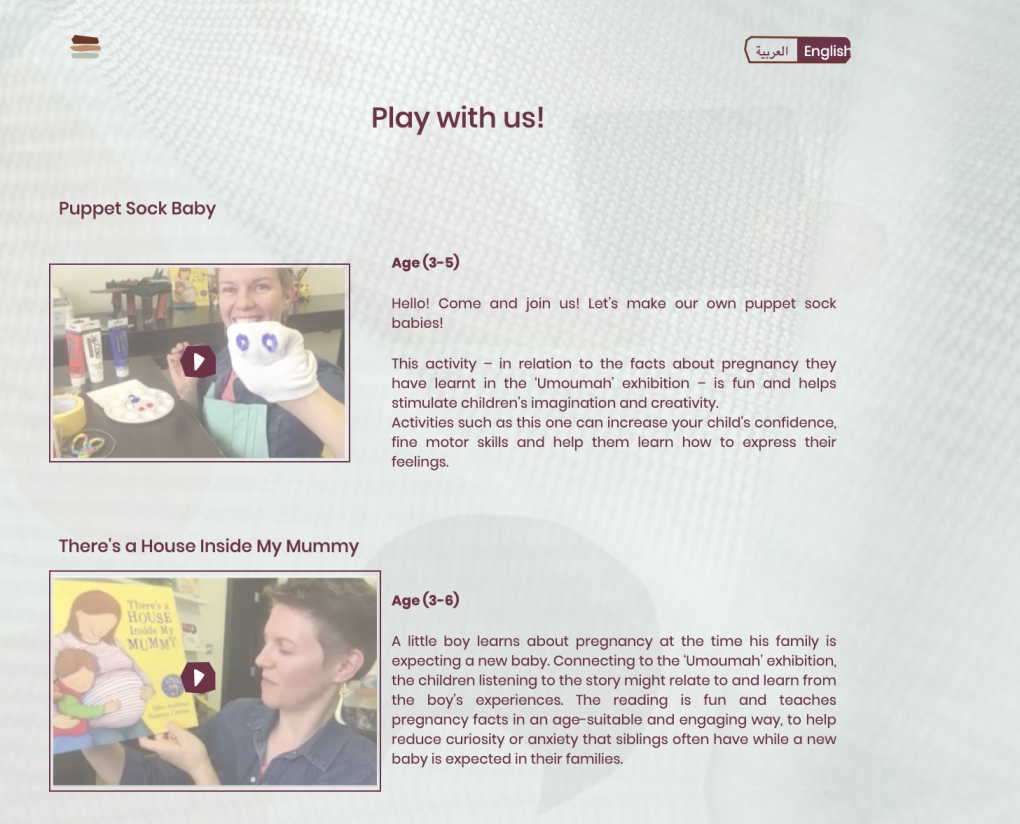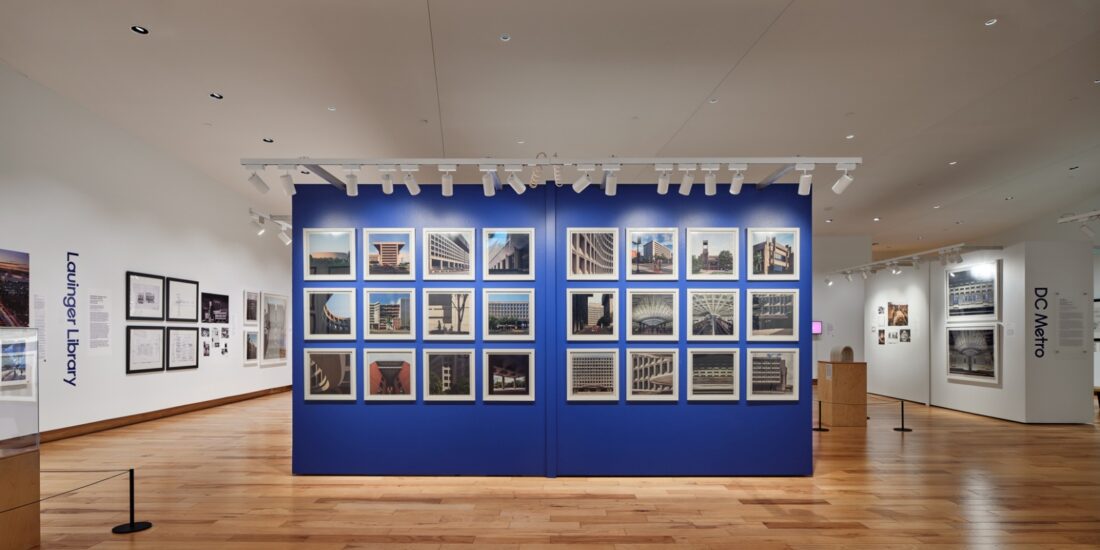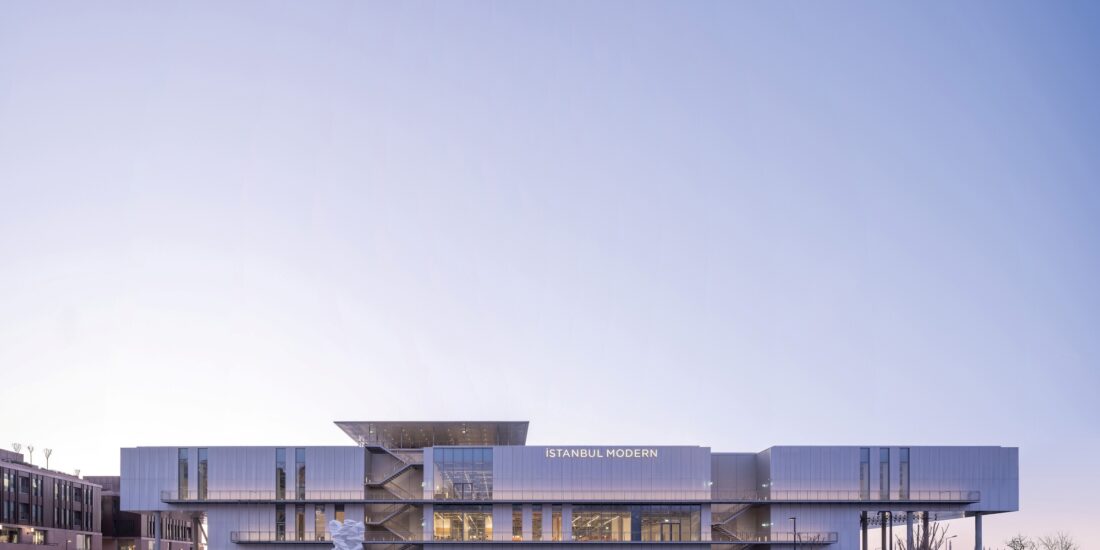An Online Exhibition from UCL Qatar
UCL Qatar students in collaboration with Sidra Medicine and Weill Cornell Medical College in Qatar created a virtual exhibition that explores the journey of pregnancy through the website Umoumah.
 The exhibition named ‘Umoumah’, which stands for “motherhood” in Arabic, features five thematic units woven together through different mediums such as video, poetry, interactive games, educational activities among others.
The exhibition named ‘Umoumah’, which stands for “motherhood” in Arabic, features five thematic units woven together through different mediums such as video, poetry, interactive games, educational activities among others.
The aim of the virtual exhibition is to explore the topic of support for expectant mothers in Qatar, with the purpose of empowering them, their families, and the medical community.
What is interesting about this online and virtual tour of the exhibition is the various mediums used by the students to connect the theme to the past and present-day scenario in the medical process in Qatar and merging the stories with videos and images with an explanation which makes the virtual tour a pleasant experience.
The students’ exhibition project is one of the core modules of the MA in Museum and Gallery Practice Programme, a programme of UCL Qatar, designed to help shape future generations of museum professionals and cultural leaders in Qatar and the region
“Launching an online exhibition is equally, or perhaps even more challenging, than launching a physical exhibition, in the sense that there is a lot of planning, communication and interaction – virtual in this case – required to achieve the goal: i.e. to invite people to visit the exhibition, to share their views, to experience it and use it.”
Dr. Catharina Hendrick,
Lecturer, Museum Studies,
UCL QATAR
Dr. Catharina Hendrick, Lecturer, Museum Studies, explains how this exhibition was developed and presented uniquely on the virtual platform, thus joining the various creative initiatives undertaken by other museums from around the world, who are creatively trying to battle this huge crisis upon the art industry. The coronavirus pandemic has had a huge impact on museums, galleries, and heritage workers with many cultural institutions in an extremely tough financial position. But many of them have started their virtual tours and some are connecting to their clientele through social outreach programme and this virtual exhibition tour can very well be considered the new direction that the Museums should be looking at in such unpredictable times.
“We see across the world that museums have responded to the pandemic in creative ways. They are opening up their collections, exhibitions, and experiences through digital platforms to engage current visitors and to welcome new audiences. This shows that museums can be responsive to change and in the current climate have to adapt and be relevant to their public. The technology already exists for visitors to engage but museums and galleries need to take a chance, see what they can do, how they can be relevant in today’s world, and reach out to new audiences,” says Dr. Catharina about the new normal.
“Our students, for instance, have successfully managed to migrate their physical exhibition to an online platform. This meant that they had to think in a different way, they had to get familiar with different issues such as, for instance, engaging with online developers, thinking about servers and links, new functionalities, and different accessibility issues. Ultimately, they had to think ‘out of the box’.”
SCALE: Do you think an online gallery view will gather enough attention?
By curating this exhibition online, it can reach a wide audience to explore the topic of support for the expectant mother in the context of Qatar. It aims to empower the mother, her immediate family, the extended community, as well as the medical community. The initial plan was a physical exhibition, but, when the COVID-19 situation presented itself, the students and UCLQ decided to swiftly move to an online exhibition, since Qatar is very comfortable with technology and social media, as well as open to new ideas and innovation in general. This exhibition provides the perfect opportunity for our students to use new skills to reach new audiences both in Qatar and beyond.
 Social media plays a significant role in securing reach and UCL Qatar’s Instagram followers have increased as well as the Umoumah page where followers come from Qatar and internationally. Online platforms provide the ideal place for people who are self-isolating to explore new exhibitions, events, book readings, and much more. One of our students, Radouane Arraoui, said it perfectly “working with the digital element has proven to be an excellent platform in order to communicate our goals and objectives to our target audience.” I am confident that our exhibition will receive plenty of attention!
Social media plays a significant role in securing reach and UCL Qatar’s Instagram followers have increased as well as the Umoumah page where followers come from Qatar and internationally. Online platforms provide the ideal place for people who are self-isolating to explore new exhibitions, events, book readings, and much more. One of our students, Radouane Arraoui, said it perfectly “working with the digital element has proven to be an excellent platform in order to communicate our goals and objectives to our target audience.” I am confident that our exhibition will receive plenty of attention!
SCALE: What is the purpose behind the theme of the show, why pregnancy and motherhood?
This year UCL Qatar Masters students have combined their efforts with Sidra Hospital and Weill Cornell Medical College in Qatar to explore the journey of pregnancy and the idea of becoming a mother. “Umoumah” features five thematic units woven together through different media such as videos, poetry, interactive games, educational activities, an app, and much more.
SCALE: Is everything else similar to how galleries get ready for a show? How do you get ready for an online preview?
The students started this process in September 2019! At that time, the venue was secured at Sidra Outpatients for the physical exhibition due to open on 30 March 2020. But, as we know, the pandemic has significantly impacted our daily lives and this definitely had a major bearing on the delivery of a physical exhibition in a hospital setting. As a result, our students had to reconfigure their exhibition from a physical space to an online ‘virtual’ space. This is not an easy thing to do. However, they had already completed all their curatorial research and worked together on the thematic units and interpretation components, so, it was a matter of deciding how this could be presented online.
 The opening of the exhibition on an online platform, of course, means that we are not physically present to celebrate this momentous occasion. However, our students and colleagues at UCL Qatar will still celebrate the opening! We will celebrate virtually, through a party on MS Teams, which is the platform we have used for all our collaborations with our students in this pandemic. We will have cake, some speeches and some laughs to commemorate the incredible work that our students have done to realize this wonderful exhibition. It is a ‘new normal’, and shows the inventiveness and resilience of everyone to deliver an exhibition to the highest standard, and proactively respond to the ever‑changing events happening around us.
The opening of the exhibition on an online platform, of course, means that we are not physically present to celebrate this momentous occasion. However, our students and colleagues at UCL Qatar will still celebrate the opening! We will celebrate virtually, through a party on MS Teams, which is the platform we have used for all our collaborations with our students in this pandemic. We will have cake, some speeches and some laughs to commemorate the incredible work that our students have done to realize this wonderful exhibition. It is a ‘new normal’, and shows the inventiveness and resilience of everyone to deliver an exhibition to the highest standard, and proactively respond to the ever‑changing events happening around us.
SCALE: What are the mediums in which the art is going to be expressed, who are the artists, and who is the curator?
At the beginning of the academic year, all students worked as a team as curators. Their job was to consider the initial concept and undertake research. This involved exploring avenues for the exhibition in terms of themes, key messages, and drawing up clear aims and objectives for the exhibition. Then, after the curatorial research was complete, all students were nominated to specific teams – marketing, exhibition design, evaluation, interpretation, and education led by a Project Officer.
 The exhibition this year does not include artworks or artists, as such. Instead, we have a range of media and ‘objects’ to convey the narrative. We have photographs of objects which come from the Sheikh Faisal Museum including a set of a baby weighing scales, press cuttings of Dr. Hamda, and a fetoscope. Today’s advocate for empowerment is Dr. Aisha Yousuf, Medical Director of Reproductive Surgery (Obstetrics and Gynecology Department, Sidra Hospital) and we have included some very interesting images from her Instagram account of robotic surgery as well as a wonderful interview the students did with her on how women can consider being a doctor in this emerging field.
The exhibition this year does not include artworks or artists, as such. Instead, we have a range of media and ‘objects’ to convey the narrative. We have photographs of objects which come from the Sheikh Faisal Museum including a set of a baby weighing scales, press cuttings of Dr. Hamda, and a fetoscope. Today’s advocate for empowerment is Dr. Aisha Yousuf, Medical Director of Reproductive Surgery (Obstetrics and Gynecology Department, Sidra Hospital) and we have included some very interesting images from her Instagram account of robotic surgery as well as a wonderful interview the students did with her on how women can consider being a doctor in this emerging field.
The remaining units look at the journey of pregnancy (‘Matrescence’) through interactive ‘games’ such as the Wheel of Cravings and Unsolicited Advice. Then, there is a section that looks at life and loss with a beautiful poem written by one of our students, MariamAl-Dhubhani(an award‑winning filmmaker) and a truly unique 360-degree immersive video specially created for this exhibition. There is a section on how women and their families and community can seek support through many different sources, links, support groups, and much more. The thematic units present the visitors with plenty of choices – everything from videos and audio, engaging and playful apps, workbooks and storytelling for families (in English and Arabic), social media posts, images of objects, poetry, and text, and beautiful drawings made by our students Charlene, Nourbanu, and Ameni. There really is something for everyone.
At the heart of this experience was ensuring accessibility and a lot of effort was made with the digital developers to guarantee functionality for desktop computers and mobile devices. This reflects the demands of visitors to museums and galleries and so the online world should also have the same points of access.
We look forward to welcoming you all to our online exhibition ‘Umoumah’.
You can also find more information about this exhibition on our Instagram page: @umoumah or look for our hashtag #umoumah #uclqatar #uclqurates





